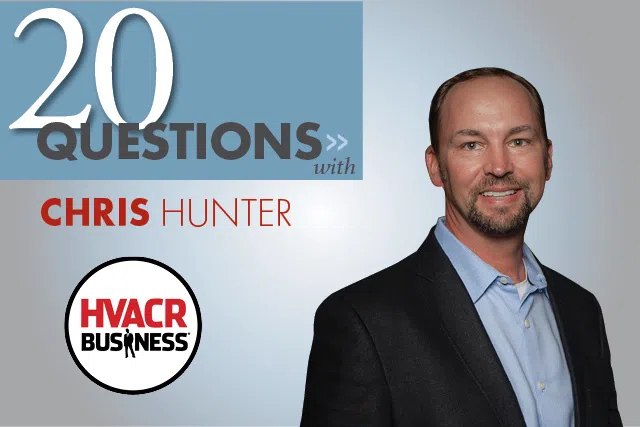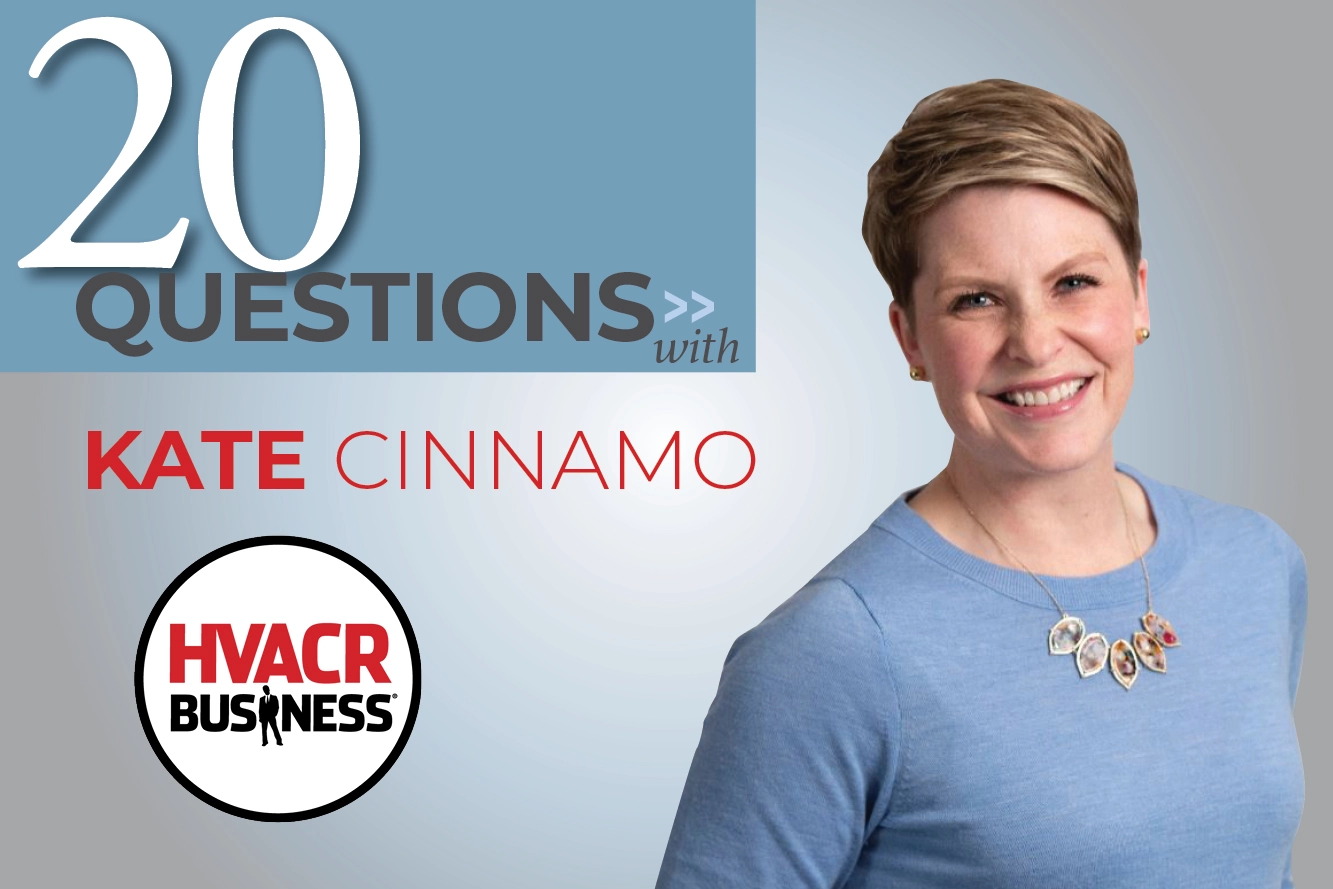HVACR Business Publisher Terry Tanker recently met with Chris Hunter, owner of Hunter Heat & Air in Ardmore, Okla. Hunter discusses making the transition from service truck to the office, differentiating from competitors and attracting employees with a great company culture.
1. Seventy percent of our readers who are owners were former service techs like you — Can you tell me how it all started?
I took an HVAC class in high school at the local trade school. But, honestly, I had no real intentions of doing heating and air conditioning work at the time.
2. You were just looking for some "easy" credit hours?
That's exactly what I was doing. I hate to say it, but I was a baseball player and was looking for an easy half-day. After graduation, I started my own tile setting business. Then, I had an opportunity to go to a year-long electrical mechanical school and was hired by AT&T as a communications technician. Just after 9/11, the company said they had to lay off 10,000 people — and I was going to be one of them — but they needed an HVAC technician and if I could pass the test the job was mine. I was extremely thankful I'd taken that class and paid attention.
3. What was your job?
I serviced their central offices. The communications equipment puts off a lot of heat and if a system went down it had to be repaired immediately — this is where my whole customer service philosophy was developed. When they called, no matter what I was doing, I had to drop everything and run to that equipment. If I couldn't get it fixed, I brought in rental equipment for temporary spot cooling. There was no throwing my hands up saying 'I can't fix it.'
4. Were there many jobs you couldn't fix?
Some, but I was really into training. I have seven NATE certifications. Any time I could, I was taking classes. There was so much work, all with different types of equipment, and I wanted to learn about all of them. AT&T was great and paid for most of my training.
5. When did you open Hunter Heat & Air?
In 2006, one of the things I did while at AT&T was to get my contractor's license. They contracted out a lot of work and I thought it might be valuable. Once I did that, I started doing work for friends and family after hours. By 2009, I was so busy I felt like I had two jobs and had to make a decision. So, after nine years with AT&T I went off on my own.
6. How long did it take you to transition from the service truck into the office?
About four years … in 2013. I took my tools out of the truck and really just concentrated on building the team and investing in them.
7. How did you learn the many aspects of managing a successful HVAC company?
I looked at who was good at this business, and what could I learn from them. I found Ron Smith's book, "HVAC Spells Wealth." I also found The Service Roundtable. I got involved and really started studying from the industry's best and that's what gave me the business outline and fundamentals.
8. Was the transition from the service truck to the office a difficult one?
Very difficult. I went from a technician standpoint of solving one problem at a time to a business standpoint where you're just taking them from all different angles. It was tempting at times to simply want to jump in the truck and go do what you do best. But I made a commitment. I knew if I did that, it would hurt the organization, so I concentrated on helping our team succeed with training, building them up and building our business instead of trying to do it all myself.
9. You offer training to everyone at the company — can you tell me more about that?
Training is a cornerstone to our success and we don't just focus on the customer service, technical and sales. We devote a lot of time on life skills. We started a Bible study and had free pizza. Before you knew it, we had other trades wanting to participate and we had to move it out of our building because 100 guys would show up.
10. How often do you train?
All month long, but the life skills training is the first Wednesday of every month. We call it the Iron Men Group. I grew tired of seeing guys come to work who were battling their finances or going through a divorce without the skills to cope. You know as well as I do, if there's trouble at home or something that's dividing their attention, it affects their performance at work. So, if you can help improve somebody's life and give them life tools to succeed, it comes back ten-fold on the work force side.
11. You've got a lot of younger service techs — how do you find them?
It really goes back to culture. If you know who you are, what you stand for and what your mission is — and you have fun doing it — you're going to attract people who want to be part of the team. They may not have an HVAC background, but that's fine.
I want people with the same values as us.
12. So you're not doing anything special?
I hear the complaints from owners who can't find people. We have an in-box full of applicants and I think that starts with our culture. I also am active on social media. I always have my eye out for prospects I think could help our company.
13. How do you differentiate your company from competitors?
Contractors are going to pay basically the same wherever you go. Maybe a few dollars more at company A and better benefits at company B. But I've found people want to be in a place where they can grow, where they're wanted, where they feel like they can make a difference and be part of a team that actually means something and gives back. Many people want to be a part of something bigger than simply a job, so often it's not only about the money.
14. Hunter Heat and Air was a runner up in our Fleet Design Contest. How did you come up with the super hero design?
It was based on having "super techs" from customer comments about our speed and professionalism.
15. I heard you have a unique way of acquiring your fleet vehicles — can you share that with me?
I have a friend who is an insurance buyer. Something has happened to the vehicle — minor accident, stolen, something where the dealer has been reimbursed and now it's for sale. Whatever the problem was has been fixed and the savings are fantastic, often $10-15k. The trick, however, is patience and timing. They aren't always available when I need one and vice versa.
16. How many do you have?
We have 19 in the service fleet, and the Camaro, which anyone in the office can use for business. We also use that for parades and events and when we open a new location. Employees drive it around town and do giveaways and promotions.
17. You don't charge overtime — what's the rationale?
My thinking is, if you know your overhead and it's allocated during your normal business hours, then when you have after-hours calls you can respond to that without extra charges to customers.
18. How do your techs feel about not earning time and a half?
They still earn time and a half, but your overhead is covered so you're not charging the customer extra. Units don't break from 8-5, and it's a better way to treat our customers. And, they noticed. It set us apart from our competitors — and now they all do it to.
19. Is your family involved in the business with you?
Yes, my wife is co-owner and I've got a daughter who is 21, a son who is 17 and my son-in-law works for me too. In fact, he just won the super tech of the year award. It's our most prestigious award. It takes a lot of good KPI scores from all the things that a technician does to win, so I'm excited about his future with us.
20. Have you reached any milestones this year?
Actually, yes. We were stuck at about 700 service contacts for about two years. We couldn't get over the hurdle. So we sat down this year and redesigned our maintenance agreement plan. I realized it was my fault, due to not having a process in place to succeed. We changed things and now have 1,700.






